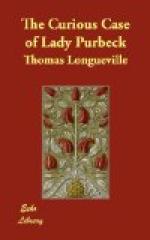James was furious. He summoned the judges to Whitehall and gave them a tremendous scolding. They fell on their knees and all were submissive except Coke, who boldly said that “obedience to his Majesty’s command ... would have been a delay of justice, contrary to law, and contrary to the oaths of the judges.”
Although Coke was now in terrible disgrace at Court, he might have retained his office of Chief Justice, if he would have sanctioned a job for Villiers, the new royal favourite. George Villiers, a young man of twenty-four, since the fall of the Earl of Somerset had centralised all power and patronage in his own hands. The chief clerkship in the Court of King’s Bench, a sinecure worth L4,000 a year, was falling vacant, and Villiers wished to have the disposal of it. The office was in the gift of Coke, and, when Bacon asked that its gift should be placed in the hands of Villiers, Coke flatly refused and thus offended the most powerful man in England. Nothing then became bad enough for Coke and nothing in Coke could be good. His reports of cases were carefully examined by Bacon, who pointed out to the King many “novelties, errors, and offensive conceits” in them. The upshot of the whole matter was that Coke was deprived of office. When the news was communicated to him, says a contemporary letter, “he received it with dejection and tears."[9]
It would be natural to suppose that by this time Bacon had done enough to satisfy his vengeance upon Coke. But no! He must needs worry him yet further by an exasperating letter, from which some extracts shall be given. It opens with a good deal of scriptural quotation as to the wholesomeness of affliction. Then Bacon proceeds to say:[10] “Afflictions level the mole-hills of pride, plough the heart and make it fit for Wisdom to sow her seed, and for grace to bring forth her increase. Happy is that man, therefore, both in regard of Heavenly and earthly wisdom, that is thus wounded to be cured, thus broken to be made straight, thus made acquainted with his own imperfections that he may be perfect. Supposing this to be the time of your affliction, that which I have propounded to myself is, by taking the seasonable advantage, like a true friend (though far unworthy to be counted so) to show your shape in a glass.... Yet of this resolve yourself, it proceedeth from love and a true desire to do you good, that you, knowing what the general opinion is may not altogether neglect or contemn it, but mend what you may find amiss in yourself.... First, therefore, behold your Errors: In discourse you delight to speak too much.... Your affections are entangled with a love of your own arguments, though they be the weaker.... Secondly, you cloy your auditory: when you would be observed, speech must either be sweet, or short. Thirdly, you converse with Books, not Men ... who are the best Books. For a man of action & employment you seldom converse, & then but with underlings; not freely but




